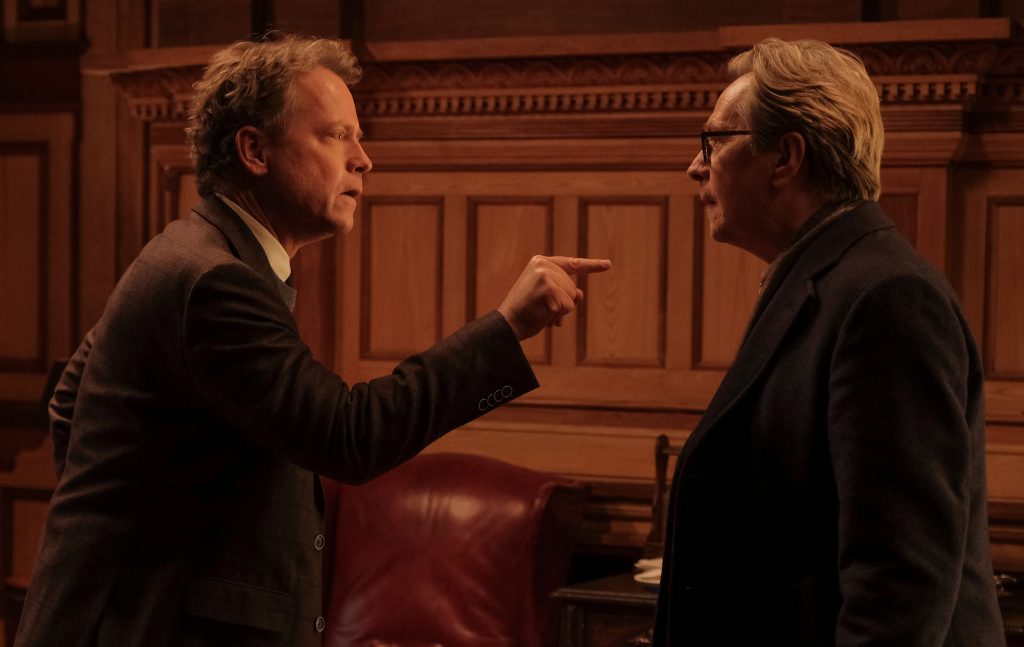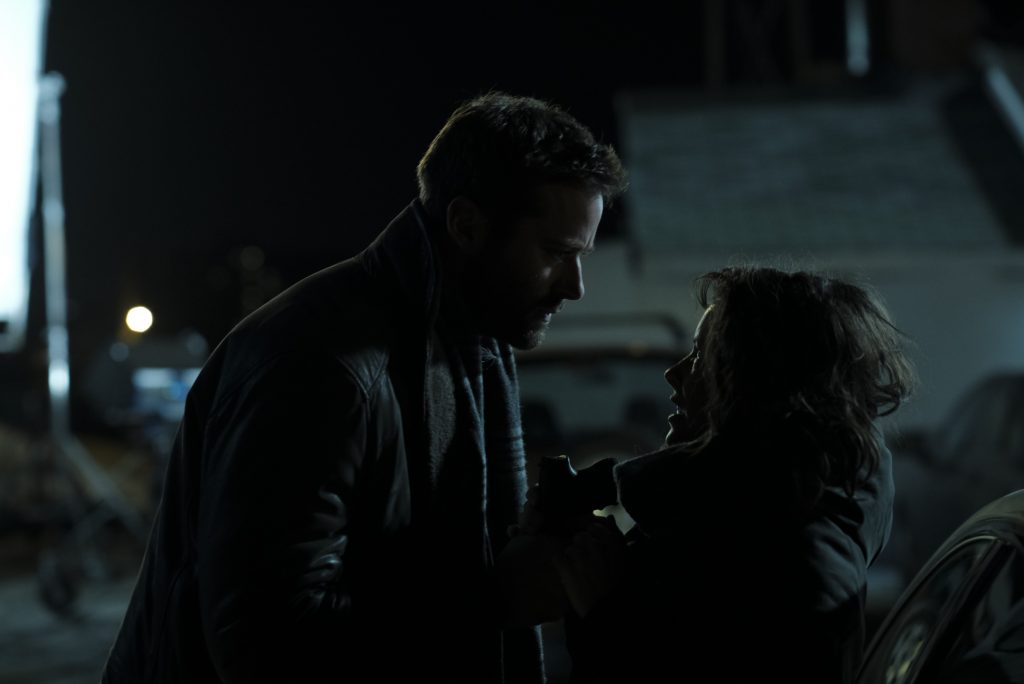February 17, 2023
by Carla Hay

“When You Finish Saving the World”
Directed by Jesse Eisenberg
Culture Representation: Taking place in an unnamed U.S. city, the comedy/drama film “When You Finish Saving the World” (based on the Audible podcast of the same name) features a predominantly white cast of characters representing the working-class and middle-class.
Culture Clash: A married mother, who works at a domestic violence shelter, tries to emotionally connect with her self-absorbed teenage son, who is an aspiring rock star, while mother and son try to make an impression on separate people whom they both admire.
Culture Audience: “When You Finish Saving the World” will appeal primarily to people who are fans of stars Julianne Moore and Finn Wolfhard; writer/director Jesse Eisenberg; the Audible podcast on which the movie is based; and rambling movies about people who think their trivial personal problems are bigger than these problems really are.

How much viewers might like “When You Finish Saving the World” will depend how much they want to watch repetitive and emotionally hollow scenes of a mother and her teenage son who are desperate to impress people who live outside their home while ignoring the problems inside their home. This mother and son feel unsatisfied with their home lives because they really don’t want to pay much attention to each other. It’s a very staged-looking and dull dramedy about privileged and entitled people trying to make themselves look socially conscious. The movie’s tone starts off as cynical and ends in a sentimental way that looks phony and unearned.
“When You Finish Saving the World” is the first feature film written and directed by Jesse Eisenberg, who is known to most movie audiences as an actor who usually plays neurotic characters. (Eisenberg was nominated for a Oscar for his starring role as Facebook co-founder Mark Zuckerberg in 2010’s “The Social Network.”) “When You Finish Saving the World” is based on Eisenberg’s Audible podcast of the same name. It’s also the first movie from Fruit Tree, a production company co-founded by spouses Emma Stone and Dave McCary with their producing partner Ali Herting. (Stone and Eisenberg co-starred in 2009’s “Zombieland” and 2019’s “Zombieland: Double Tap.”) “When You Finish Saving the World” had its world premiere at the 2022 Sundance Film Festival.
Even though the movie has respected and talented creatives who used their clout to get this project made, “When You Finish Saving the World” still looks and feels lightweight and inconsequential. It’s a film that could have had a lot more to say and a better way to say it. What viewers will get are many scenes where the two central characters snipe at each other and whine a lot (especially when they’re at home), but they put their best selves forward when they become fixated on someone whom they want to impress. They try to come across as enlightened and virtuous to those people.
In “When You Finish Saving the World” (which takes place in an unnamed U.S. city but was filmed in New Mexico), the two main characters are Evelyn Katz (played by Julianne Moore) and her teenage son Ziggy Katz (played by Finn Wolfhard), who are frequently at odds with each other. Evelyn is a politically liberal, longtime activist who currently works as a manager at a domestic violence shelter called Spruce Haven. Ziggy, who’s about 16 or 17 years old, is a wannabe rock star, who plays (according to his description) “classic folk rock with alternative influences.”
Ziggy is the old child of Evelyn and her mild-mannered husband Roger Katz (played by Jay O. Sanders), who stays out of the squabbles that frequently happen between Evelyn and Ziggy. When this family of three have meals together, Roger often has to listen to Ziggy and Evelyn complain about whatever little things that are bothering Ziggy and Evelyn at the moment. When Roger tells Ziggy it’s “cultural appropriation” for white people to play blues music, Ziggy (rude as ever) yells at Roger, “Dad, just shut the fuck up!”
The Roger character had a much bigger role in the podcast, where Roger was a central character. In the “When You Finish Saving the World” production notes, Eisenberg explains why he made Roger a small supporting role this movie version: “Now he is almost a forgotten presence who can’t get anyone to pay attention to him.” Roger’s role in the movie is so small, it has almost no impact on the story. His most memorable line in the movie is when he truthfully says about his household: “Everyone around me is a narcissist.”
Evelyn is disappointed that Ziggy has turned into a self-centered brat who only seems to care about how many more followers he can get on social media. Ziggy currently has 20,000 followers on HiHat, a social media platform that was fabricated for this movie but is obviously supposed to be a lot like YouTube. The irony of Ziggy’s growing popularity on HiHat (where he can reach people virtually around the world) is that Ziggy is a social outcast at his high school where people can interact with him in person. Ziggy is upbeat and cheerful to his followers online, but in real life, he’s often moody and unfriendly.
Evelyn has a personality that can best be described as a combination of being bland and uptight. She had hoped that her only child would want to follow in her footsteps of pursuing a career that involves helping underprivileged and disadvantaged people. She’s asked Ziggy to volunteer at the shelter, but he refuses. Instead, Ziggy does things such as berate Evelyn when she goes in his room and inadvertently interrupts one of his livestream performances, where many of his followers pay to see Ziggy perform his original songs and cover tunes. Ziggy also does video chats directly with his followers.
As an example of how clueless Evelyn is about the Internet and how disconnected she is from Ziggy’s interests, she has no idea what a livestream is. To prevent any more interruptions during his livestreams, Ziggy angrily installs a red studio light outside the top of his bedroom door. He tells his parents that if the light is on, that means he’s doing a livestream—and under no circumstances can anyone go inside the room when the red light is on.
Evelyn thinks Ziggy’s music is a hobby. When Ziggy says that he’s going to be a professional musician, Evelyn asks him: “Have you thought about your end game?” This is Ziggy’s insolent response: “I’m going to be rich, and you’re going to be poor.”
Considering all the real problems in the world, this type of bickering in “When You Finish Saving the World” looks very petty and very much like “privileged people’s problems.” But this is the type of “family turmoil” that the movie is trying to pass off as heavy, when it’s just so trivial. Evelyn should consider herself lucky that she doesn’t have to listen to Ziggy’s off-key singing and tone-deaf guitar playing. (Emile Mosseri composed the music for the movie, including the two forgettable original songs that Wolfhard co-wrote under the alias Ziggy Katz.)
Evelyn and Ziggy clearly aren’t very happy in their lives or with each other. They will each meet someone who becomes a reason for Evelyn and Ziggy to try to project a more socially conscious and caring image in public. Observant viewers will notice that it’s just Evelyn’s and Ziggy’s way of distracting themselves from their problems at home. Evelyn and Ziggy are a lot more similar to each other than they would like to admit.
Evelyn’s “distraction” is a 17-year-old named Kyle (played by Billy Bryk), who arrives at the shelter with his feisty mother Angie (played by Eleonore Hendricks), after leaving their home because Angie’s husband/Kyle’s father has battered Angie. (This abusive man is never seen in the movie.) Kyle is in his last year of high school. Evelyn can’t help but notice that Kyle is everything that she wishes Ziggy could be: kind, respectful to his mother, and compassionate about other people’s problems.
Meanwhile, Ziggy develops a big crush on a classmate named Lila (played by Alisha Boe), who is a full-on stereotype of a progressive social justice warrior who is constantly preaching to other people about the politically correct way to live. The movie downplays the reality that Ziggy is most likely attracted to Lila because of her physical looks, not because he’s attracted to her emotionally or intellectually. At any rate, Ziggy suddenly wants to transform into being willfully ignorant about sociopolitical issues to being the type of sociopolitical activist that he thinks will impress Lila, who correctly suspects that Ziggy isn’t being genuine.
Evelyn’s interest in Kyle becomes an obsession that borders on being very creepy. She wants to treat him almost like a down-and-out family member, even though she barely knows him. One night, Evelyn goes to the shelter, just to give Kyle some leftovers from her family dinner. It’s a thoughtful gesture but also very condescending. Kyle looks uncomfortable with this offer, and he politely tells Evelyn that he’s already eaten dinner.
Evelyn also becomes determined to convince Kyle to go to Oberlin College, a liberal arts school in Oberlin, Ohio. She even goes as far as saying that she will recommend Kyle to someone she knows who is an Oberlin College admissions officer. But does Kyle really want to go to college?
The situation is complicated by the fact that Kyle worked in the auto body shop of his abusive father, who is apologetic about the domestic violence attack on Angie, and he wants Kyle to come back to work for him at the auto body shop. Angie, like many domestic violence victims, is conflicted about whether or not she should go back to her attacker. Evelyn thinks it’s a bad idea for Angie and Kyle to go back to live with their abuser.
However, the shelter only has limited time and space for those it helps. Evelyn isn’t exactly coming up with any real solutions for the issue of where Angie and Kyle can live after their time at the shelter expires. It’s a common problem for temporary residents of domestic violence shelters, but “When You Finish Saving the World” essentially ignores this problem.
One of the biggest issues that viewers will have with the way the movie portrays Evelyn is how she treats very serious and complicated issues with surface-level platitudes. The movie goes overboard in making Evelyn look out-of-touch and borderline incompetent in her job where she’s supposed to help victims and survivors of domestic violence. Sending Kyle to a college that Evelyn wants him to go to doesn’t directly address problems this teenager might have from being emotionally scarred or influenced by the domestic violence experienced in the home. Evelyn is the type of “activist” who is more about “talking” than “doing,” when it comes to real solutions for the people she wants to help.
The biggest problem with “When You Finish Saving the World” is that most viewers just won’t care much about any of the characters in this monotonous film. There’s nothing wrong with the acting in the movie, but all of the principal cast members have been better in other films. “When You Finish Saving the World” is the equivalent of forcing people to watch car wheels spin in the same place until the car starts moving too late. This 88-minute movie only starts to pick up steam in the last 15 minutes. But by then, viewer interest might have waned or disappeared altogether.
A24 released “When You Finish Saving the World” in select U.S. cinemas on January 20, 2023.


